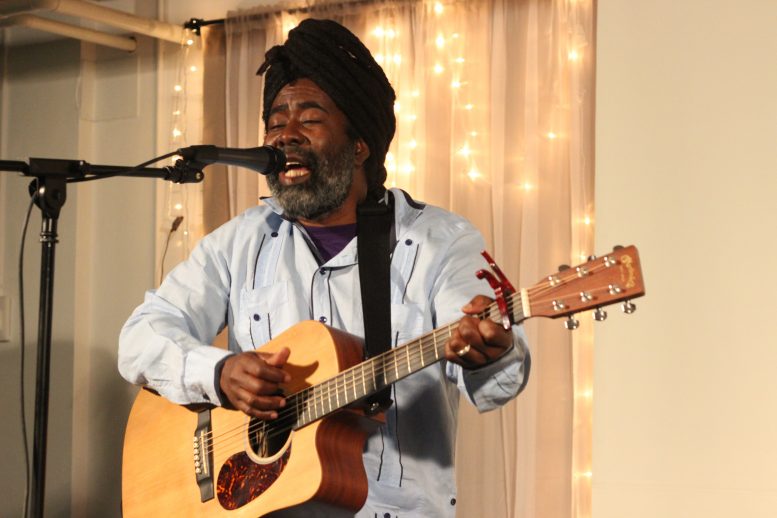By DAVID DUPONT
BG Independent News
For the poor of Port au Prince, Haiti, life was always hard. Then came the earthquake in 2010.
Mona Augustin was not one of those poor. He is a musician who lived with his bandmates.
After the earthquake he went to an open area in the city where people once played soccer. Now it was occupied by a city of rudimentary tents occupied by people driven from their homes by the earthquake.
For the next five years, Augustin set aside his music to take on the role of helping this community, which came to be known as Mozayik. Now he’s back making music in the service of the people of Mozayik.
The Haitian singer-songwriter is visiting Bowling Green this week with his wife and fellow activist Candice Welsh. Augustin performed Wednesday night at the First Presbyterian Church and will perform another free show tonight (Feb. 8) on the Bowling Green State University campus. The presentation, which includes a performance by Augustin preceded by the screening of a short documentary film by Jon Bougher about Mozayik, will be at 7 p.m. in the multipurpose room (228) of the Bowen-Thompson Student Union.
Life in the makeshift village was hard. The residents barely had the essentials for life. The film shows them trudging through narrow muddy alleys between canvas tents to bathe and fetch water. Yet that subsistence living itself was threatened.
A large commercial building was being constructed in the next lot, and the company, Arcotec Haiti owned the land, and working with the government sought to evict the residents, offering them $125 in US dollars to leave. Little of the millions in aid dollars that flowed into Haiti found their way to the poor.
Augustin tried to work with the mayor for some reprieve, but in the end the project trumped the interested of the residents. The company sent workers in to destroy the village.
Augustin was able to locate land in a development called Canaan outside the city where the government had granted a commission the right to give land to displaced people. The ocean front property was like paradise, though water and other necessities had to be brought in from the city.
Turns out the ownership was disputed, and in time police and thugs arrived to tear down what was built, sending the Mozayik community to a more inhospitable hillside plot.
Every time Augustin was ready to leave the community, a new crisis would arise that needed his attention, and people would beg him to stay. In the film, his face often registers discouragement and exhaustion.
Now Augustin has found property with a river nearby, a well, and schools close at hand. With help from a philanthropist the property was purchased. This will be a permanent home. A community center and a model home have been built. The children on the site can attend school something they haven’t been able to do since the earthquake.
And while he splits his time between Madison, Wisconsin and Haiti, he has not abandoned those in Mozayik. “I will continue to fight for people to have a better life,” he said. His weapons are his voice, guitar, and imagination.
So he tours spreading the message of hope and raising funds. It costs $8,000 to build a home and relocate a family.
Augustin sings in a high, clear tenor. He accompanies himself on guitar with lacy arpeggios, melodic fills, and percussive chords.
He plays almost all originals. After the set, he explained that earlier in his career he only played songs by others. A record producer approached him. The producer liked his voice and wondered if he wrote his own songs. Augustin did not. The producer was not interested in a recording of covers, so the deal fell through. So Augustin set about writing songs.
And though the words are most often in Creole, French or Spanish, Augustin told the audience: “I know your soul will understand.”
He introduced each with an explanation of its theme.
His songs can be politically charged. The evening opened with a video of images from Haiti displaced. Augustin calls on the government to live up to its responsibilities, spelled out in the country’s constitution and find housing and the basics of life to the poor.
He evoked Haiti’s past and said it was possible that the island could again be called “The Pearl of the Antilles”
In his set, he paid homage to Africa and America, and those continents’ “lost children.” He echoed Jesus’ saying that no one is a prophet in his own land. Sometimes, he said, it’s necessary to move away from home to be appreciated.
And he sang love songs, including “This Love Is Blessed.”
Love, he said fuels his work and mission.
While some politicians want people to fight each other, people “don’t want to,” he said. “We are all on one planet. We are all the children of God.”
(For more information visit www.mozayikvillage.org)

